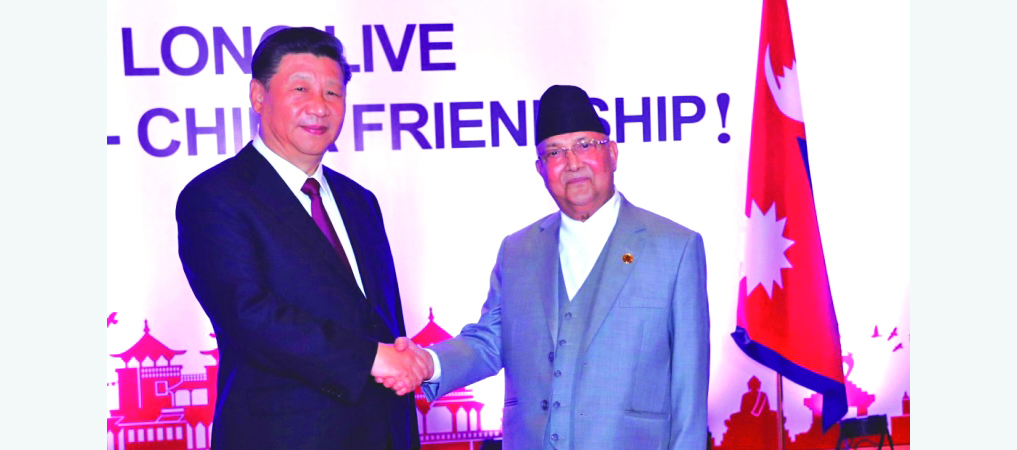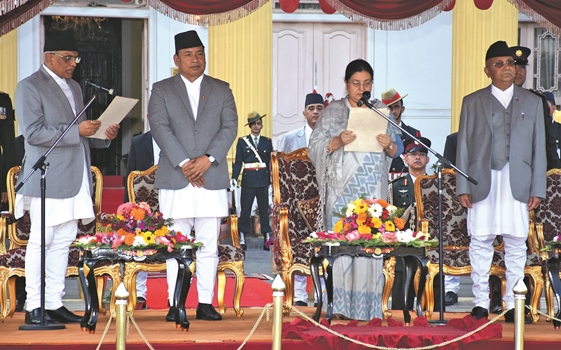Wang’s Nepal Visit
Adds Impetus To Implement Bilateral Deals

Ritu Raj Subedi
Chinese State Councillor and Foreign Minister Wang Yi’s three-day visit (March 25-27, 2022) to Nepal has added new impetus to Sino-Nepal cooperation and partnership. In the recent past, the two nations had signed a number of agreements but their implementation has not gained pace owing to several factors such the COVID-19 pandemic, internal instability and external pressure. Prior to making his stopover in Nepal, Wang toured Afghanistan, Pakistan and India, bolstering its peripheral diplomacy that seeks to ‘deepen mutually beneficial, cooperative, and win-win relationships with the neighbours.’
Chinese FM Wang landed in Nepal almost one month after Nepal’s parliament approved the $ 500 million Millennium Challenge Corporation grant. There were misgivings whether the acceptance of US grant by Nepal government will have negative repercussions on Sino-Nepal relations. However, according to Dr. Dinesh Bhattarai, former foreign affairs advisor to late prime minister Sushil Koirala, Nepali political leadership was able to allay the doubts of China with regard to its security concern, as all political parties have been constantly sticking to One China policy. They have committed not to allow anyone to abuse the Nepali territory against the northern neighbour. Nepal-China relations are marked by friendliness, high level understanding, mutual support, cooperation and respect for each other’s sensitivities. So it is naivety to argue that a controversial geopolitical issue will sour Nepal-China bonhomie.
Vital accords
During Wang’s visit, the two nations inked at least nine agreements on economic and technical cooperation, cross-border railway and transmission line, maintenance of Arniko Highway (third phase), cooperation in the railway sector, Nepal’s grass export to China, duty free access of 98 per cent Nepali goods to China, supply of anti-COVID vaccine and RMB 600 million grant to Nepal for the year 2020. Some detractors claim that Nepal did not sign any deal on projects to be executed under the Belt and Road Initiative (BRI). Some Indian media outlets went on to interpret it as a snub to BRI projects.
It is true the two nations have yet to pick specific projects to be built under the BRI. But whatever the name given to the projects, most of above agreements fall under the BRI framework. To avoid the unnecessary external gaze, the two nations have decided to implement some vital projects without labelling them BRI ones. For example, the agreements on the feasibility study of cross-border railway and power grid interconnection bear strategic importance for connectivity, investment, trade, hydropower development, tourism and people-to-people contact between the two nations.
The feasibility study of cross-border railway has been long overdue. All major and minor political parties commit to bringing Chinese rail to Nepal for reducing the country’s excessive dependency on the southern neighbour but the two nations are yet to agree on the modality of investment as it needs a huge amount of money and advanced technology. The KP Sharma Oli government had asked China to construct the cross-border railway on grant as a symbol of friendship between two neighbours but the Chinese side says it wants to decide the investment modality only after completing its feasibility study.
In a similar manner, the deal on the power grid interconnection has paved the way for the construction of the Ratmate-Rasuwagadhi-Kerung double-circuit 400 kV inter-country power transmission line. Though the agreement is about the feasibility study of the Nepal-China electricity grid interconnection, it has given the go-ahead for starting the process of constructing the transmission line immediately, according to the concerned authorities. The agreement has approved most of the works related to building the transmission lines.
Nepal has set an ambitious scheme of generating 15,000 MW of electricity in 10 years. Nepal-China cross-border transmission line will be milestone in fulfilling this goal, thereby harnessing the nation’s immense power potential. Nepal is now importing electricity from and exporting to India. The southern neighbour has shown reluctance to buy Nepal’s electricity produced by companies other than Indian. In that case, Nepal can export its surplus power to Tibet Autonomous Region of China. However, Nepal-China power grid interconnection should open the door for trilateral cooperation in energy sector between Nepal, China and India in the long-run.
Railway and electricity form the basis to building a robust Trans-Himalayan Multi-Dimensional Connectivity Network between Nepal and China. With the cross-border railway service, China wants to make the Himalaya its gateway to South Asia, a home to the world’s 24.89 per cent population. It may be a potential game changer in turning Nepal into a regional geopolitical hub and leveraging in the conduct of independent foreign policy. In his meeting with his Nepali counterpart Dr. Narayan Khadka, Wang stated that Nepal should become a promising land for cooperation between China and South Asia, and play a bigger role in regional and international affairs.
Shared benefits
In yet another positive development, China has agreed to immediately start the process for the return of Nepali students to China to continue their studies on a priority basis and resume, at an early date, the passenger air services suspended due to the COVID-19 pandemic. In view of the declining threat of COVID-19, the two sides have realised the need for fully operationalising the Tatopani/Zhangmu and Rasuwagadi/Kerung border ports for two-way movement of goods between Nepal and China. Nepali merchants have been complaining that halt of Nepali containers carrying Chinese goods at the border points has adversely affected their business as well as Nepal’s economy already hit hard by the pandemic. As a trustworthy neighbour, China must not delay in addressing this particular demand of Nepali business community.
Nepal and China have agreed for keeping Nepal-China border peaceful and tranquil in the spirit of the Boundary Treaty and carry out joint inspections of Nepal-China boundary through mutual consultations. It is high time the two sides should activate Nepal-China Joint Consultation Mechanism created to complete existing key cooperation projects and explore new areas of cooperation. Both the nations are able to translate their mutual friendship and practical cooperation into reality if the bilateral projects are finished in time to their shared benefits.
(The author is Deputy Executive Editor of this daily.)
Recent News

Do not make expressions casting dout on election: EC
14 Apr, 2022
CM Bhatta says may New Year 2079 BS inspire positive thinking
14 Apr, 2022
Three new cases, 44 recoveries in 24 hours
14 Apr, 2022
689 climbers of 84 teams so far acquire permits for climbing various peaks this spring season
14 Apr, 2022
How the rising cost of living crisis is impacting Nepal
14 Apr, 2022
US military confirms an interstellar meteor collided with Earth
14 Apr, 2022
Valneva Covid vaccine approved for use in UK
14 Apr, 2022
Chair Prachanda highlights need of unity among Maoist, Communist forces
14 Apr, 2022
Ranbir Kapoor and Alia Bhatt: Bollywood toasts star couple on wedding
14 Apr, 2022
President Bhandari confers decorations (Photo Feature)
14 Apr, 2022











